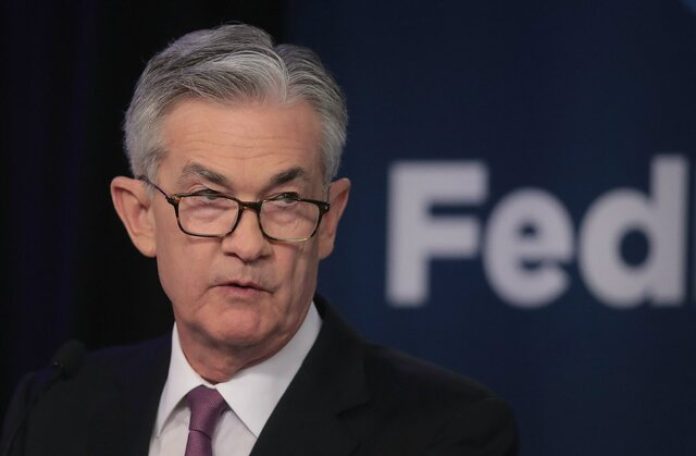16 Juni 2023 – The Fed mempertahankan kemungkinan menaikkan suku bunga lagi dan mempertanyakan pasar
Have we reached the top or not yet?
Anyway, we’ve come close to that and that’s enough!
This question and this answer is what is going on in the heads of traders in the US stock markets until now, since the end of the Federal Reserve meeting and the speech of its chairman, Jerome Powell, that followed it.
After the Market Committee’s decision to keep the interest rate unchanged at 5.25%, which came as most expectations indicated, the Federal Reserve Chairman made it clear that most members agreed that further interest rate hikes would be appropriate, and that no member saw the possibility of a rate cut this year. What has been done in terms of restricting monetary policy has not yet been shown its impact, especially on inflation.
Interest rates will be determined with every upcoming meeting of the Market Committee without pre-emption and based on what will be received from the data, which gives greater relative weight to the economic data to move the markets, especially the data indicating inflation. Over-lifting or under-lifting as necessary have become parallel.
He also did not confirm that the Fed would stop raising the next meeting in July, God willing, but rather tried to keep the door open to the possibility of raising, and he also avoided saying that the current interest rate seems sufficient to bring down inflation at the rate of 2% annually, which is what he talked about after the meeting of the third of May. Past to indicate and direct to stop uploading the next meeting which, as we have seen, has already happened.
While the economic assessment issued by the committee showed that the decision to keep the interest rate unchanged this time will help give members more time to reassess the situation through more data.
This is what came from more than one of the Fed’s conservatives before the meeting, such as the vice-presidential candidate, Philip Jefferson, who stated before the obligatory silence of the members before that meeting, “If the Fed stops raising now, it will give it a greater opportunity to see and examine more data to find out the extent of the need for monetary policy.” hawkish in order to contain inflation,” according to Reuters as well, which was agreed with Patrick Harker, a member of the Market Committee and President of the Federal Reserve Bank of Philadelphia, who said explicitly that he was inclined to support a “hold” in raising interest rates two weeks before that meeting.
In addition, the Fed stressed that inflation remains high and remains committed to returning inflation to the target of 2% annually in the medium term. It also reiterated that it still seems a long way to go to reach this target. The need for the Fed to further tighten monetary policy until reaching 2%.
He also stated that it is possible that the target inflation level of monetary policy will not come without a decline in economic growth below its average rates and without a decline in the performance of the labor market.
He also said regarding credit conditions that its conditions, which have become more stringent, will likely push the household sector and companies to reduce borrowing, which may affect economic activity, employment and inflation, but he added that the extent of this impact is still uncertain.
While the average expectations issued by the members of the Market Committee after their meeting on the fourteenth of this month were as follows:
For the interest rate:
Reaching 5.6% by the end of 2023, 4.6% for 2024, 3.4% for 2025, from 5.1% for 2023, 4.3% for 2024, and 3.1% for 2025, which was expected by members last March.
They also predicted growth:
To refer to 1% for this year, 1.1% for 2024, and 1.8% for 2025, from 0.4% for 2023, 1.2% for 2024, and 1.9% for 2025 that members expected last March.
As for the unemployment rate:
Members expected it to be at 4.1% by the end of this year, 4.5% in 2024 and 4.5% for 2025 from 4.5% in 2023, 4.6% in 2024 and 4.6% for 2025 that members expected last March.
As for inflation:
The average expectation of the members of the committee regarding the price index of personal expenditure on consumption was as follows:
3.2% by the end of 2023, 2.5% by the end of 2024, 2.1% by the end of 2025, from 3.3% by the end of 2023, 2.5% by the end of 2024, and 2.1% by 2025, which was expected by members last March.
Excluding food and energy prices from the index, the average expectations of members are as follows:
3.9% by the end of 2023, 2.6% by 2024, 2.2% by 2025, from 3.6% by the end of 2023, 2.6% by 2024, and 2.1% by 2025, which was expected by members last March.
To make it clear, in general, the Fed’s willingness to raise the interest rate and keep it as an option for it if necessary in order to contain prices, and that the members of the committee still place containing inflation at the top of their priorities.
While the members expected an improvement in economic performance this year than what the members expected in March, but with a decline in growth rates later in 2024 and 2025 and a rise in the unemployment rate from current levels as a result of the tightening of monetary policy in order to contain inflationary pressures, but their expectation of a rise in the rate Unemployment came in less than what members expected last March.
While their expectations for inflation, excluding food and energy prices, are still rising from one meeting to another, which shows their continued appreciation of the risks of rising inflation, despite what has been achieved so far after raising by 5% during the past 15 months, inflation remains more than double what the Fed targets.
On the other side of the Atlantic, it was stated by the President of the European Central, Christine Lagarde, during the press conference that followed the expected decision of the European Central to raise the interest rate on deposits in the euro by 25 basis points, to become 3.50%, and also the interest rate on refinancing, to become 4% yesterday. The interest rate to counter inflation, which has become strongly supported by ART
Increase wage levels within the labor market.
Lagarde also indicated to raise the interest rate again in the next July meeting clearly, with members’ expectations rising for inflation to be at 2.2% in 2025, while the European Central Bank targets 2% annually, which led to support for the euro against major currencies, to rise again to trade near 1.095 against the dollar. .
US stock indices tended to decline initially, immediately after the meeting of the committee members to raise its expectation of the interest rate by the end of this year to 5.6% on average, which keeps the door open for another hike by 25 basis points, or as the Federal Reserve Chairman said during his press conference, who also made it clear that these are the expectations of the members of the Federal Reserve. The current time and not the decisions of what showed at the same time that he does not want these expectations to look like a commitment that must be fulfilled by the Fed.
Not to mention that in general, and with a further look, market participants found that the summit of raising the interest rate seemed close, if it had not already arrived, so that was encouraging risk taking in the US stock markets once again.
For the futures contracts of US stock indices to return to achieving gains since then until now, as the Dow Jones Industrial Future Index is currently located near the psychological 34500, and the Standard & Poor’s 500 future index also rose above the psychological level of 4400, as it is currently located near 4440, as well as the Nasdaq. 100 for the future, to reside above 15200 despite being exposed to profit taking after the start of the American session at the time of writing this report.
Pakar pasar mata uang dan logam/ Walid Salah El-Din Mohamed
Email / chief.economist@hotmail.com

















